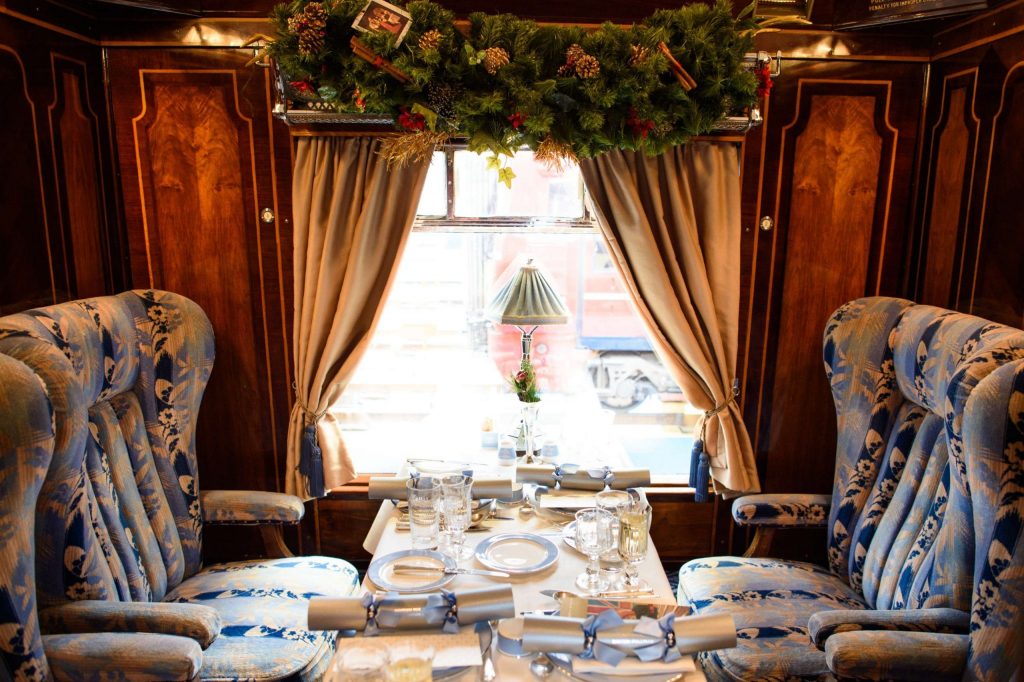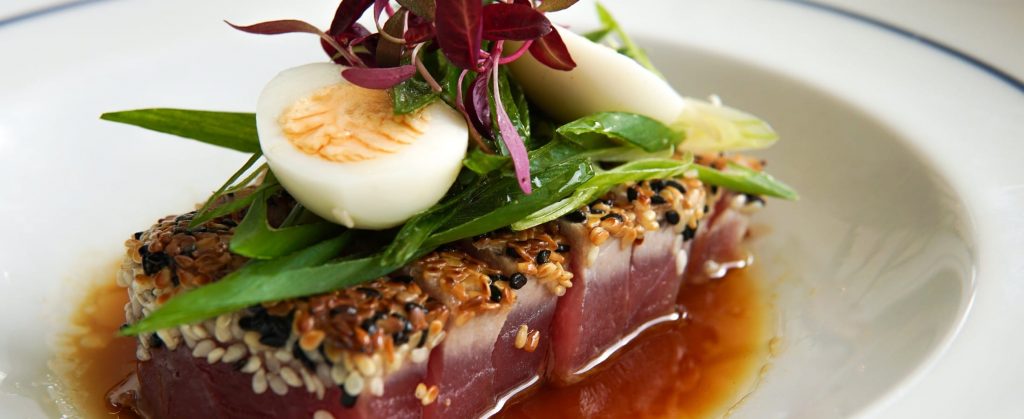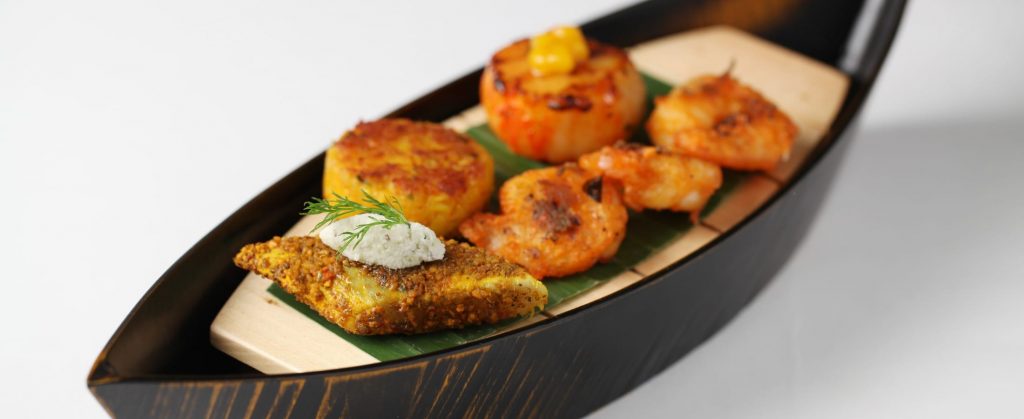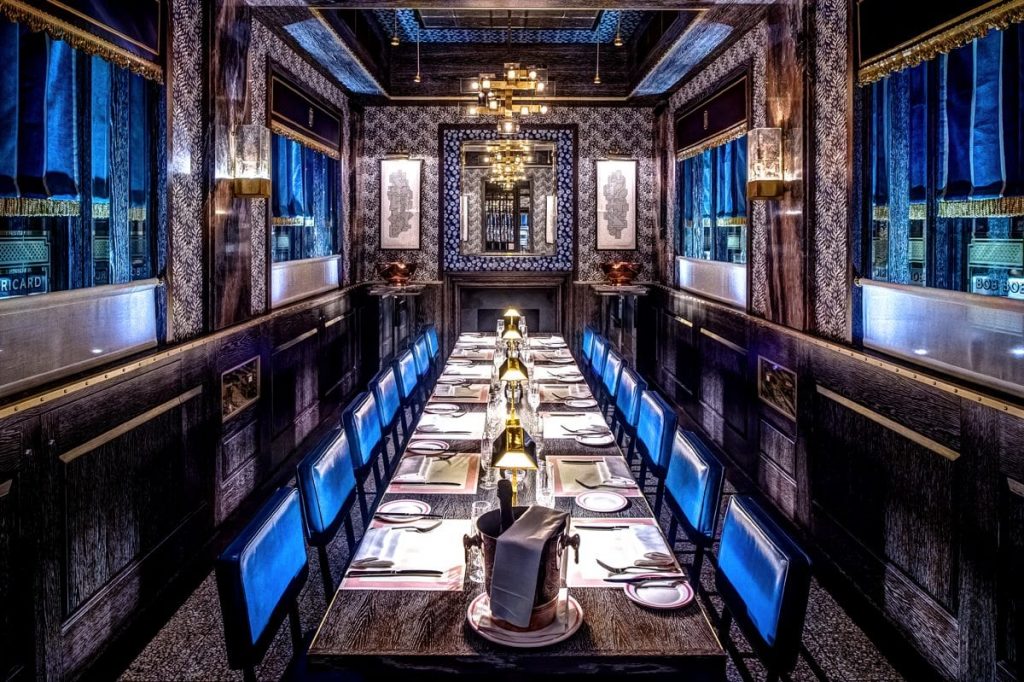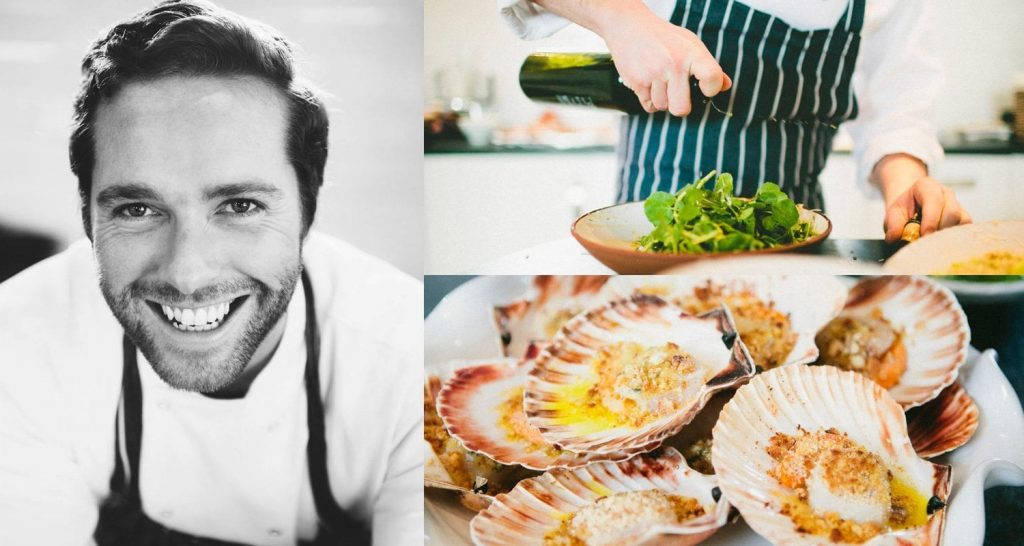Andrew Wong is a culinary star that hardly needs an introduction. With his critically acclaimed Chinese restaurant A. Wong in Pimlico gaining two Michelin stars in 8 years, A. Wong is the first Chinese restaurant to gain the double accolade outside of Asia. Andrew talks to The Sybarite about what the accolade means not only to him but for Chinese restaurants worldwide, the importance of Chinese New Year and the art installation at A. Wong to celebrate it, the symbolism behind dumplings, and what it means to be a British-born Chinese chef.
You had an unusual path to becoming a chef – you studied Chemistry at Oxford University and Social Anthropology at LSE – how do you think this has shaped your career as a chef?
If I said to you I went to university to become a Chemist or an Anthropologist, I would be lying – especially at the age of 19 and 23, I didn’t have a clue of what I wanted to do. But actually, as an experience, it was more about studying things that I enjoyed and giving myself a bit of a fuller education. Does Chemistry inform my cooking? No, not really! There is nothing I would need to do in the kitchen that would require a degree from Oxford in Chemistry! However, what it did allow me to do was question things in a slightly different way. When I do hit walls now, I have a thought process that is a little bit more rational as opposed to being completely based on trial and error.
With regards to Anthropology, it’s a strange one because I never imagined becoming a chef when I was studying at LSE, but the one thing I do remember is this idea of studying Food Anthropology – whether things are culturally created or they are a bit more biological. I think that is what grew that fascination for Food Anthropology – there is no answer to it, food is so deeply engraved into our social being that it really is an integral part of looking into who people are and how they became who they are and the choices that they make and the things that they value.
And I think that is a fascinating thing to look into, because as a restaurateur, it gives you another layer of appreciation for what you could possibly do. When people come into the restaurant, it is not about filling their stomach, you have the opportunity to do something more, and this is something we try to utilise in the restaurant and it is something that has been an integral part of our journey as a restaurant.

Congratulations on your 2nd Michelin star for A. Wong. You are the first chef at a Chinese restaurant outside Asia to win two stars. What does the accolade mean to you?
Before you win one or two Michelin stars, it seems like a very selfish endeavour, it is something you just are winning for yourself and the restaurant and the team. But actually, two weeks ago, when we won the second one, was the first time I sat down and reflected and realised this isn’t for us at all – this is a massive milestone for all Chinese restaurants on the international dining scene outside Asia, an appreciation for all the hard work of all the restaurateurs who have opened all different types of Chinese restaurants over the past 150 years, throughout different Chinese diasporas.
We can sit here as a very privileged restaurant (A. Wong) and say we are to excite people about different aspects of Chinese culture through our food, we use cultural and historical references and various different academia to inform our cooking. But this privileged position is only possible due to the accumulation of hard work of all the people before us – my father and grandfather included – and every husband and wife Chinese takeaway owner etc. All these people have allowed us to stand here and say, Chinese food isn’t just about cooking food for everyone, it is about cooking the boundaries to appreciate Chinese culture as a larger entity.
It is an accolade for the community, and it is the first time in a long while where I thought of myself as a part of the wider Chinese community. Running a restaurant can be quite blinkard and you just focus on your microcosm but this is one of the moments where you realise that what you do is actually larger than that. It is part of the community and how it is accepted and how it is received in wider culture.
How would you describe the cuisine at A. Wong?
It is first and foremost Chinese. We do a lot of research to ensure that the base flavour profiles are near enough exactly the same as historical and technical Chinese techniques. But at the same time I like to think that our food is quite explorative, in the sense that we do not specify that our food comes from a specific region and we don’t specify that it comes from a specific style. It is more a celebration of China as a whole, a country that borders 14 other countries, a country that has 3000 years of gastronomic history.
What people don’t often know is that Chinese cuisine has basically stolen so many influences from other cuisines over the past 3000 years! China is actually one of the very first cultural sponges of multiple cuisines and yet somehow over the years, it has turned those influences into just being identified as Chinese cuisine – it has become a pigeon holed cuisine. So part of what we do at A. Wong is to try and get people to question that just because Chinese cultures or other cultures use certain ingredients, that means it is automatically fusion cuisine. And part of our battle and struggle of the last few years is getting people to question those misconceptions.

You travelled through China for 6 months when you were younger. How did your trip through China shape your cooking and the cuisine at A. Wong?
I would never call myself an expert on Chinese cuisine. I spent a lot of time in Hong Kong growing up, my father’s side of the family was from Szechuan, and the whole of London was basically only offering Cantonese cuisine as Chinese food. So my reference point growing up was a little bit of Sichuanese cuisine and a lot of Cantonese cuisine. Now that is not actually at all reflective of China as a whole. So when I actually started travelling around China at the age of 19, that is really when I started getting my education on Sandor Cuisine, Beijing or Pekingese cuisine, Western Chinese cuisine.
I am not going to say that just because I am Chinese, by default, I know everything about the cuisine – and so many people presume that. The restaurant, and it’s evolution, is as much an education for myself as it is for our guests. And I think a lot of people think that I must have some internalised knowledge, that has mysteriously osmosed into my body. But no – we study, we learn, we go to other kitchens, we talk to other chefs, we go work in their kitchens, to try to learn what they hold as important about their particular cuisine. And if I can bring some of that back to celebrate their cuisines, then we have achieved what we want to.
Tell our readers more about the augmented reality art installation with Gordon Cheung at A. Wong?
Gordon is a highly celebrated, British-born, Chinese artist. He is very cool, very current and we have known each other for many years. Which is why I have probably never seen him in that way, when you grow up with someone you never really see them in the eye of the public perception. And it’s probably similar vice versa, where he doesn’t really see me as a chef, he probably just sees me as the idiot that he has known for so many years! But one of our mutual friends questioned why we had never done something together.
So as it was lockdown, and it was coming up to Chinese New Year, we realised there were not going to be any Chinese New Year celebrations this year – no Chinatown lion dances, no focal point for the Chinese community within London and the UK, so we thought what can we do? My restaurant is not being used at the moment due to lockdown, so Gordon suggested we use the restaurant as a massive installation to celebrate the fondness we have for our community as British born Chinese and basically to give London a little bit of happiness. Of course London is still in lockdown, so the installation will also be online, and as we come out of the first stage of lockdown people can walk past and look at the art works.
Our entire conservatory is basically vinyl wrapped in his artwork, which is not only a depiction of Chinese New Year but more of this idea that Chinese New Year is that moment of the year where we look forward to times. That moment where you almost forget about the bad and you move and push forward to the blossoming times, the happier times – that is the sentiment behind the work. Furthermore, Gordon is extremely embracing of technology (unlike myself) so the AI side of it is that if you point your phone at the installation from across the road, the installation will begin to move. So hidden images of ox and flowers come to life through the AI.

We are trying to celebrate our particular journey of being British-born Chinese and navigating our Chinese-ness within our British-ness, through art, and when we get to open again and so when I get to contribute to the project, through food. The installation was very kindly sponsored by our friends at Remy Martin, which is so fitting because their logo – the sagittarius horse – represents reaching for the stars, and innovating whilst keeping very much grounded to your roots. That is the message that really resonates with Gordon and I when we talk about navigating our roots through our contemporaries. It is this idea that we are still on our journey but we are still trying to push boundaries in our own fields. But part of that is only possible because we are using our roots and our culture and our ancestry as a pillar for making that possible.
What does Chinese New Year mean to you?
I am a second generation Chinese, and for me, Chinese New Year, when I was growing up, was very much about happiness. This was about the one time when our whole family would come together. My family were in the hospitality industry and so we didn’t really get to see our family very much, so it was the one time where we sat down altogether, ate together and the one time where we forgot about the fact that my parents were in a restaurant 16 hours a day, and my sister and I weren’t really seeing our parents. It was a time when we saw all the relatives that we didn’t see over the year – grandparents, aunties, uncles and cousins.
As I get older, as I have two kids of my own now, I find myself basically falling into exactly the same shoes that my parents were, as much as I resented it at the time. So now, it is really important to me to make a special effort for my children at Chinese New Year, to try to bring that same sentiment to my kids. They are navigating their Chinese-ness, within a very different Britain now, it is a very different navigation to what I experienced as a kid, so it is very important to me to instil in them a level of cultural appreciation. What does it mean to be Chinese? Why is the Chinese/ Lunar New Year important to our culture? Why is it even called the Lunar New Year and is it on a different day each year, unlike Christmas which is on the same day each year?
So to me, it is a time of reflection in terms of family. It is the time where I really sit down and check myself on my own shortcomings as a father and as a chef, in making professional sacrifices sometimes, and how to find a better balance between professional and personal life. In China, during Chinese New Year, the entire country locks down, so it doesn’t matter who you are but everything closes.

What impact do you think covid, and the closure of so many restaurants will have, both short and long term, on the hospitality industry?
Short term – a lot of restaurants will and have closed. What you must remember is that restaurants are part of a chain and if they close that affects suppliers, fishermen, farmers, vegetable growers, these are all going to basically suffer. So how do we navigate the short term interim whilst we begin to find out feet again.
In terms of guests, when we come out of lockdown, I think there will be the classic British binge reaction, like people are being released into freedom, and it will be carnage. And the important thing for us as a restaurant, is that we navigate that time wisely. The last time we came out of lockdown, we really had to limit the number of guests we have, we had to completely change the way we interact with our guests, we have to bring them different kinds of protocol whilst not affecting the experience for our guests.
But likewise, what you will find is that restaurants and small businesses, as they come out of this, will have learnt the idea of improvising and hustling. And I mean that in the most positive way – as a way of resilience through tough times. So that when problems do arrive in the future, you can put it into perspective, this is just a small thing we can overcome. When you put people into a position of necessity, you really begin to see the creative thinking and the entrepreneurial spirit. This is why small restaurants, who have been able to be dynamic and flexible, are the ones who have navigated these last 12 months better than anyone else.
Long term – I think a lot of countries will see smaller, more personalised restaurants, as opposed to large corporate chains. Also, with some many people ordering takeaway and having to do their own cooking, will have two long term effects. Firstly, people have realised how expensive ingredients are.
And secondly, they have come to realise, restaurants are magical places. I cook Chinese food for a living, but I cannot cook restaurant quality food at home. As soon as lockdown ends, I will go to Chinatown with my family, because there is something about the experience, but also the cooking from a technical side of it. If you could create Chinese restaurant standard food at home, your house would probably be on fire right now, because the fire has to be so strong. People are finally figuring out the real magic behind restaurants. Going out to a restaurant is so much more than having some food, it is about something we cannot put our finger on, which is not just interacting with the person you are going out with, but the staff and the vibe that makes going to restaurants so magical.
What is your favourite dish to cook?
Shanghai Dumplings. I will tell you why – it is the dish that has been on our menu since day 1 but it is a dish that is constantly being tweaked. This is a change the guests might not even really notice, but for me it has been such a massively integral part of my journey as a restaurateur – this idea of constantly trying to find ways of making our dishes better. I won’t say ours is the best, it is entirely subjective, but for me the journey has been more important than the end product. It is the idea of looking into something that may seemingly appear so trivial – it’s just a dumpling! – but actually there are so many components to it that need to be explored and worked on, which has been a fascinating and symbolic process through the last 8 years.

